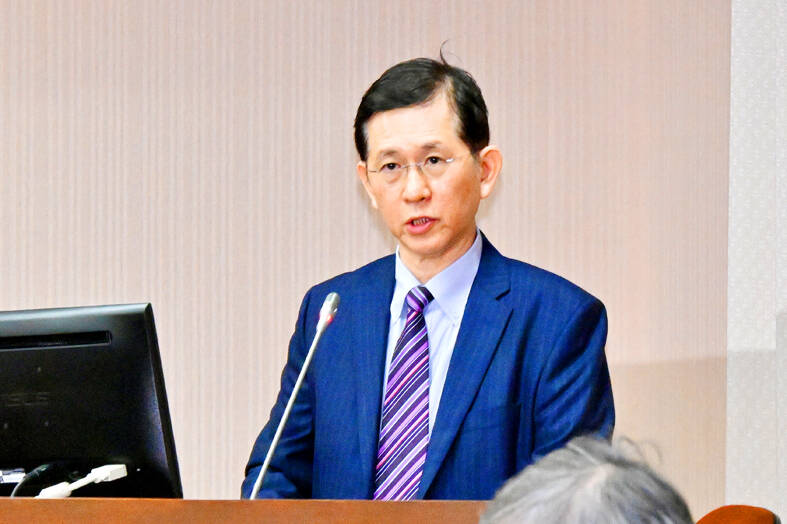From Monday next week, businesses must be registered on telecoms’ “white lists” before they can send text messages containing Web links or phone numbers, the National Communications Commission (NCC) said yesterday.
The measure aims to curb scams through text messages, the commission said.
Article 2 of the Fraud Hazard Prevention Act (詐欺犯罪危害防制條例) authorizes telecoms to improve anti-fraud mechanisms for commercial text messaging.

Photo: George Tsorng, Taipei Times
As of last month, more than 400,000 fraud-related text messages had been distributed this year, NCC data showed.
As a text message can contain no more than 80 Chinese characters, many scammers send targets to Web pages by including links, some of which are shortened to hide their destination, NCC Secretary-General Huang Wen-che (黃文哲) said.
Businesses must from Monday next week apply with telecoms if they want to include Web links and phone numbers in commercial text messages, Huang said.
Once their applications are approved, they must register the links and phone numbers that would be included in their text messages, he said.
Only messages containing those registered links and phone numbers would be distributed, he said.
Businesses must reapply if they want to change the registered information, he added.
The content of all commercial text messages would be subject to scrutiny, and telecoms should not deliver messages that contain unregistered links and phone numbers or come from businesses that have yet to secure approval to send messages, Huang said.
Telecoms should expedite delivery of text messages sent from reliable corporate customers, he said.
As for potential scams committed through text messages sent by individuals, Huang said that while those are protected by the constitutional right of freedom of correspondence, individuals would not be able to send more than 50 text messages per day, and would be subject to criminal penalties if they were found to have used text messages to commit fraud.
In other news, Minister of Digital Affairs Huang Yen-nun (黃彥男) told lawmakers at a meeting of the legislature’s Transportation Committee that starting next year online advertising platforms are to adopt a real-name system to regulate advertisers in order to curb fraud.
The ministry has rolled out a series of supporting measures since the Fraud Hazard Prevention Act entered into force in July. One of them is to require Google, Line, Meta and TikTok to take down fraudulent advertisements within 24 hours after being notified. Advertisers on the platforms must use their real names to register.
Several government-funded banks and corporations have said they would pull their ads from large digital platforms that do not require advertisers to register using real names.
“All large digital platforms are adjusting their systems to comply with anti-fraud regulations,” he said. “The real-name system would first apply to high-risk advertisers, such as those that feature celebrities in their advertisements or run large quantities of advertisements,” he said.

Chinese Nationalist Party (KMT) Chairman Eric Chu (朱立倫), spokeswoman Yang Chih-yu (楊智伃) and Legislator Hsieh Lung-chieh (謝龍介) would be summoned by police for questioning for leading an illegal assembly on Thursday evening last week, Minister of the Interior Liu Shyh-fang (劉世芳) said today. The three KMT officials led an assembly outside the Taipei City Prosecutors’ Office, a restricted area where public assembly is not allowed, protesting the questioning of several KMT staff and searches of KMT headquarters and offices in a recall petition forgery case. Chu, Yang and Hsieh are all suspected of contravening the Assembly and Parade Act (集會遊行法) by holding

PRAISE: Japanese visitor Takashi Kubota said the Taiwanese temple architecture images showcased in the AI Art Gallery were the most impressive displays he saw Taiwan does not have an official pavilion at the World Expo in Osaka, Japan, because of its diplomatic predicament, but the government-backed Tech World pavilion is drawing interest with its unique recreations of works by Taiwanese artists. The pavilion features an artificial intelligence (AI)-based art gallery showcasing works of famous Taiwanese artists from the Japanese colonial period using innovative technologies. Among its main simulated displays are Eastern gouache paintings by Chen Chin (陳進), Lin Yu-shan (林玉山) and Kuo Hsueh-hu (郭雪湖), who were the three young Taiwanese painters selected for the East Asian Painting exhibition in 1927. Gouache is a water-based

Taiwan would welcome the return of Honduras as a diplomatic ally if its next president decides to make such a move, Minister of Foreign Affairs Lin Chia-lung (林佳龍) said yesterday. “Of course, we would welcome Honduras if they want to restore diplomatic ties with Taiwan after their elections,” Lin said at a meeting of the legislature’s Foreign Affairs and National Defense Committee, when asked to comment on statements made by two of the three Honduran presidential candidates during the presidential campaign in the Central American country. Taiwan is paying close attention to the region as a whole in the wake of a

OFF-TARGET: More than 30,000 participants were expected to take part in the Games next month, but only 6,550 foreign and 19,400 Taiwanese athletes have registered Taipei city councilors yesterday blasted the organizers of next month’s World Masters Games over sudden timetable and venue changes, which they said have caused thousands of participants to back out of the international sporting event, among other organizational issues. They also cited visa delays and political interference by China as reasons many foreign athletes are requesting refunds for the event, to be held from May 17 to 30. Jointly organized by the Taipei and New Taipei City governments, the games have been rocked by numerous controversies since preparations began in 2020. Taipei City Councilor Lin Yen-feng (林延鳳) said yesterday that new measures by